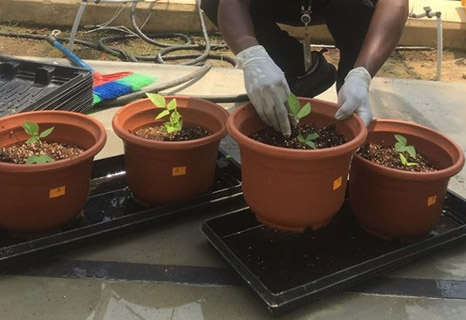Leveraging pathogen genomics for an improved domestic pig health and production by mapping African swine fever virus transmission dynamics at the wildlife-livestock interface in Tanzania
Thematic Area: Food security and agribusiness
University: Sokoine University of Agriculture, Morogoro, Tanzania
Project Leader: Dr Jean Nepomuscene Hakizimana
Collaborating Partners: Ghent University, Merelbeke, Ghent, Belgium; The Roslin Institute and Royal (Dick) School of Veterinary Studies, University of Edinburgh, Easter Bush, Midlothian, United Kingdom
Duration: 24 months
Project Overview
Preamble
Climate change, change in land use and agricultural practices have increased the interactions between wildlife, livestock and humans, increasing the risk of pathogens transmission at their interface. For instance, most emerging infectious diseases are suspected to originate from wildlife, including African swine fever (ASF), Ebola virus disease (EVD) and coronavirus disease 2019 (COVID-19). The viral community in Serengeti ecosystem in Tanzania is largely unknown, and increased interaction between livestock, humans and wildlife can lead to spillover of pathogens with potential to spread and cause diseases, including ASF. ASF is an example of animal pandemic currently devastating the global domestic pig industry. The domestic pig industry is threatened by ASF, a transboundary animal disease that can kill 100% of domestic pigs and has neither a fully licensed vaccine nor treatment. The virus spills over to domestic pig populations from warthogs and soft ticks carried by warthogs, which neither show clinical signs nor die from the disease. Understanding the ASF virus (ASFV) transmission dynamics is important in establishing appropriate disease control strategies.
The technology
Pathogen genomics offers unprecedented potential to provide insight into the viral communities present in a given sample through a metagenomics approach by taking advantage of the high sensitivity of next-generation sequencing technologies. Genomics data are essential to describe the disease pattern and new strains, assist in outbreak tracing, advance our understanding of pathogen virulence, and design tailored diagnostic tests, vaccines, and therapeutic development. This project aims at leveraging pathogen genomics for improved domestic pig health and production by mapping ASFV transmission dynamics at the wildlife-livestock interface in Tanzania. A multidisciplinary approach combining genomics, anthropology, entomology, epidemiology, and ecology will be adopted during the implementation of this project.
Expected Impact
As a result, the project will contribute to the increase of domestic pig production, food and nutritional security and improved livelihoods of domestic pig farmers through ASF control.
For more information, please contact the Project Leader.












